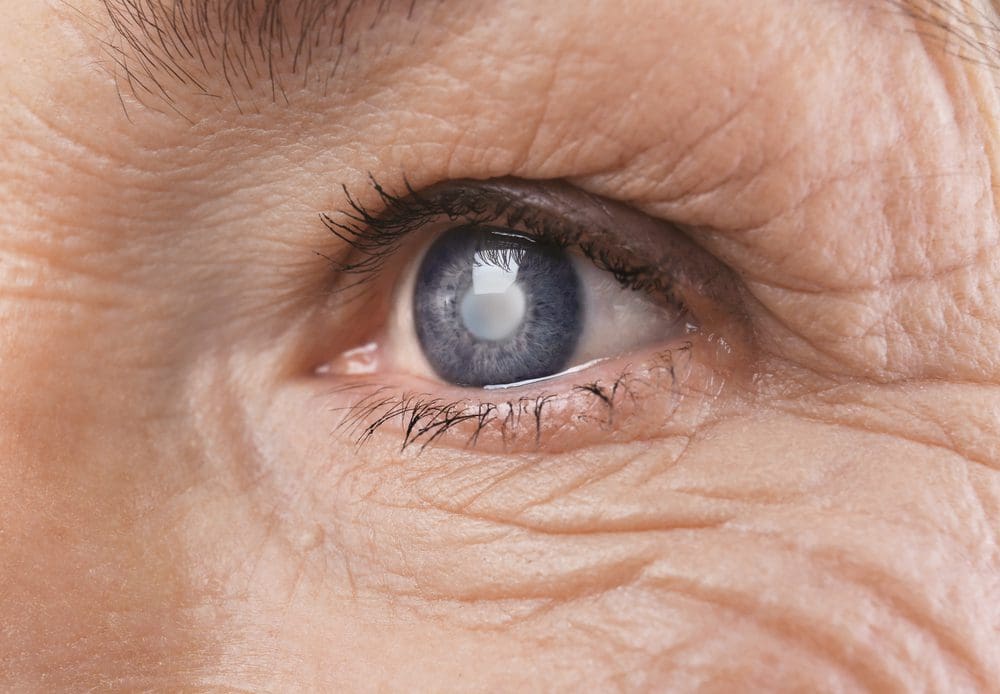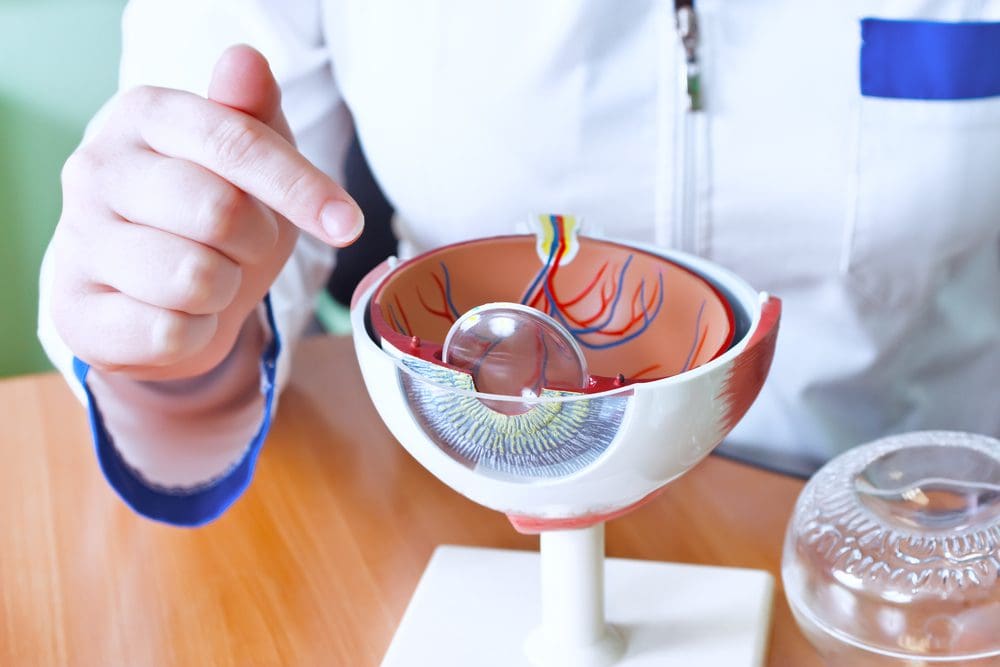
It’s a sad fact that as we age, our vision is likely to deteriorate, affecting some of our everyday activities. One reason for this deterioration is the formation of cataracts making our vision blurry and images indistinct. Whilst the wearing of glasses or contact lenses can help, the only lasting way to resolve the problem is to consider cataract surgery.
However, with the combined pressures of an ageing population and the disruption of the NHS due to the Covid pandemic, lengthy waiting lists have caused people to consider other options.
We have created a guide to assist you in deciding whether to pay for private surgery. We will show you the different types of treatment available and the cost of cataract surgery in your area.
Table of Contents
Introduction to Cataract Surgery
A cataract occurs when the proteins in the natural lens of your eye clump together. This makes the lens cloudy and less light is able to get through to the retina at the back of your eye. These clumps of proteins get bigger over time, making it harder for you to see. In severe cases, cataracts may result in a loss of vision.
Cataract surgery is a procedure to remove the clouded natural lens of your eye and replace it with an artificial lens thus restoring your vision.
Cataract surgery is the most common surgical procedure in the developed world. According to the NHS, it is highly effective and has a high success rate in restoring eyesight.
As there are no medicines or eye drops which can improve your eyesight, surgery is the only option.
Can I have Cataract Surgery on the NHS?
The NHS will only offer surgery if your cataract is severely affecting your quality of life as a result of your deteriorating vision.
You may use the following symptoms to determine if your cataract impacts your daily living:
- You cannot see properly in very bright or dim light
- Bright lights seem extra glaring
- You don’t see colours with the same clarity
- Your vision develops a brown or yellow tinge
- You may develop double vision
- Halos start appearing around bright lights such as bulbs
- Glasses don’t seem to work as effectively as before
However, you will only be offered monofocal lenses which have a single point of focus. The lens will be fixed for either near or distance vision, but not both.
Another consideration is the length of the waiting list which may be many months depending on your location.
Studies show that patients in London and Bedfordshire waited for 9 months for cataract surgery on the NHS.
The situation was not much better, even before the pandemic. Patients had to wait for an average of over 5 months to receive cataract surgery.
As a result, many people choose private providers for their cataract surgery. There are different procedures to choose from with varying costs. Additionally, you may have access to treatment options that are not available on the NHS.
What are the Benefits of Private Cataract Surgery?
The benefits of private cataract surgery include:
- Access to the latest lens technology allowing you to become glasses-free.
- A range of multifocal lenses enabling you to take part in sports and daily activities without the need for glasses or contact lenses.
- A greater choice of hospital or clinic to suit your individual requirements
- A greatly reduced wait for your surgery.
- An appointment that fits into your own schedule and at a time that is convenient for you.
- Your own chosen consultant, a personalised treatment plan and the continuity of being treated by the same consultant throughout.
- Possibility of having other vision problems, such as astigmatism, corrected.
- The ability to fund your operation with private medical insurance as the majority of providers cover cataract surgery.
Cataract Surgery Cost in the UK
The cost of cataract surgery in the U.K. ranges from £1,995 to £7,500 per eye. This will vary depending on a number of factors such as location, individual clinic, type of procedure, type of lens needed and individual eye surgeon.
Here is a brief summary of private cataract surgery costs from some of the major providers:
Price of Cataract Surgery with Different Providers
| Provider | Monofocal Lens | Multifocal Lens | Toric Lens | Toric Multifocal Lens | Financing Options |
|---|---|---|---|---|---|
| Optical Express | £1,995 | £3,195 | - | - | Yes |
| Ultralase | £2,495 | £3,245 | - | - | Yes |
| Optegra | £2,395 | £3,595 | £2,995 | - | Yes |
| Optimax | £2,995 | £3,245 | - | - | Yes |
| Nuffield Health | £2,795 - £3,070 | - | - | - | Yes |
| BMI Healthcare/ Circle Health Group | £2,073 - £2,119 | - | - | - | Yes |
| Practice Plus Group | £1,995 | - | - | - | Yes |
| HCA Healthcare | £2,950 | - | - | Yes | |
| Aspen Healthcare | £2,625 | £3,350 | £3,025 | £3,750 | Yes |
| Ramsay Health Care | £2,560 - £2,800 | - | - | - | Yes |
| Spire Healthcare | £2,298 - £3,620 | £3,069 - £3,620 | - | - | Yes |
| Independent Providers | £2,500 - £3,090 | £3,500 - £7,500 | - | - | Yes |
Prices are correct at time of publication but may be subject to change.
Let’s explore the costs from the different providers in greater depth:
Optical Express
Optical Express was established in 1991 and now operates over 120 clinics around the country.
The cost of cataract surgery at Optical Express starts from £1,995 per eye for monofocal lenses. The price for multifocal lenses starts from £3,195.
The cost covers fees for all follow-up visits for one year. Any medication for the initial 3 months is also covered under the charges.
After that, you need to pay £100 – £200 for additional appointments.
Optical Express also offers finance options that require a £500 security deposit. You may pay £48.89 in monthly instalments for 36 months for monofocal lenses.
Ultralase
Ultralase have 20 clinics in cities including Belfast, Manchester, Birmingham, Leicester, Glasgow, and London. The provider charges £2,745 per eye for monofocal lens replacement.
Additionally, patients who choose multifocal lenses will need to pay £3,245 per eye. The charges include aftercare appointments following the surgery.
Monthly instalments are also available with a £500 deposit. For example, you may pay £187.08 every month for 12 months interest free for monofocal lenses.
Finance options are also available for 18, 24, and 48 months. You will have to pay a total of £3,206 if you choose the 48 months option for monofocal lenses..
Optegra
Optegra eye hospitals are another leading choice for cataract surgeries. They provide surgery at 10 locations including London, Manchester, Surrey and Leeds.
The cost of standard cataract surgery with a monofocal lens starts from £2,395 per eye with a free consultation. The price starts at £3,595 per eye for surgery with a multifocal lens.
In addition, the cost for cataract surgery coupled with astigmatism treatment is £2,995 per eye.
Like many other hospitals, Optegra offers payment options spread across 12 to 24 months. You may pay £159.67 monthly for 12 months for standard monofocal lens cataract surgery.
However, the financing option will need an upfront payment of 10% or 20% of the total costs.
Optimax
Optimax has 20 locations across the U.K. Fixed price treatment is available with monofocal lenses at £2,745 per eye.
The price of surgery for both eyes is £5,490. As this is carried out as an outpatient procedure, you may return home on the same day.
In addition, you may choose to have laser lens replacement surgery at Optimax.
Laser surgery with a standard monofocal lens implant costs £2,995.
The cost for surgery with a monofocal premium lens is £3,245.
Surgery with multifocal lens replacements will cost £3,495.
Optimax gives you financing options for 12, 18, 24, and 48 months. You will need to pay a deposit of £500 and £187.08 per month for one year for monofocal lenses.
Nuffield Health
Nuffield Health has hospitals in 31 locations throughout the UK. The cost of cataract surgery at Nuffield Health varies based on the hospital you choose.
For example, you will have to pay around £2,875 for cataract surgery with monofocal lenses in one eye at Nuffield Health hospital in Cambridge.
A preliminary appointment with a consultant ophthalmic surgeon is included in this cost.
The cost when you undergo surgery with monofocal lenses at Nuffield Health Hospital in Cardiff is £3,070. It covers the initial consultation fee of £200.
At the hospital in Brighton, the cost of cataract surgery with monofocal lenses is approximately £2,795. It includes the initial consultation charges of £140.
The cost is transparent and there are no hidden charges. In addition, you may spread your payments over 10 months without paying any interest.
BMI Healthcare - Circle Health Group
BMI Healthcare was acquired by Circle Health in 2020 and is one of the leading private healthcare providers with 54 hospitals across the UK.
Surgery with monofocal lenses starts from £2,775. The cost includes all surgery charges and follow-up appointments at the hospital. However, the cost will vary depending on the procedure you choose.
Patients may choose to pay in monthly instalments without any interest or security deposit for 12 months. However, you will be charged an interest rate of 9.9% per year for longer payment durations.
Practice Plus Group
Practice Plus Group is the largest independent provider of NHS services. They operate over 70 healthcare centres throughout the U.K.
The cost of cataract surgery is the same all across Practice Plus Group’s locations. You need to pay £1,995 per eye for monofocal lenses. However, you may have to book an initial consultation for a fee of £95.
Practice Plus Group accepts leading medical insurance providers. Additionally, monthly payment plans are available.
HCA Healthcare
HCA Healthcare runs multiple clinics, hospitals, and outpatient centres in the U.K. Some of the leading locations include the London Bridge Hospital, The Portland Hospital and Chiswick Medical Centre.
The HCA website doesn’t list the prices for cataract surgery. Contact the individual hospital such as the Princess Grace Hospital and The Wellington Hospital to confirm costs. Fixed prices may be available at certain locations.
The healthcare provider allows patients to use medical insurance. In addition, you may be able to take advantage of financing options.
Aspen Healthcare
Aspen Healthcare is one of the oldest private healthcare providers in the U.K. It was established in 1988 and now operates 5 facilities.
The cost for cataract surgery is based on the Aspen Healthcare hospital you choose.
For example, you will have to pay the following rates for cataract surgery at the Midland Eye Private Clinic in Solihull, West Midlands:
- £2,625 for surgeries with standard monofocal lenses
- £3,025 for surgeries with toric lenses
- £3,350 for surgeries with multifocal lenses
- £3,750 for surgeries with multifocal toric lenses
At other locations such as the Parkside Private Hospital in London, you can expect to pay £2,600 under an inclusive package for monofocal lenses.
Ramsay Health Care
The price of cataract surgery is different at each hospital.
Cataract surgeries at The Berkshire Independent Hospital range from £2,700 for monofocal lenses.
The same procedure with monofocal lenses costs £2,560 at the Ashtead Hospital.
However, you will have to pay £2,800 or more for surgery with monofocal lenses at the Boston West Hospital.
All locations of Ramsay Health Care offer the option to pay interest-free in 10 monthly instalments. You may pay for a longer duration at higher costs.
Spire Healthcare
Spire Healthcare is one of the largest healthcare providers in the U.K.
The organisation runs 39 hospitals and 8 clinics across the country.
The cost of cataract surgery varies based on the hospital or clinic you visit.
You will have to pay £3,557 to undergo your operation with monofocal lenses at the Spire Leeds Hospital. The fees also include an initial consultation fee of £200.
However, at the South Bank Hospital in Worcester the prices are lower. It charges £3,081 per eye for monofocal lenses, which covers a consultation fee of £249.
In comparison, you will have to pay £3,620 for surgery with monofocal lenses at Portsmouth Hospital.
Independent Clinics
The Centre for Sight, an advanced provider of eye care and surgeries, offers laser cataract surgeries at £3,150 with a monofocal lens replacement. Surgeries with multifocal lenses cost £4,100 per eye, while toric lenses cost £3,995.
The Moorfields Private Eye Hospital provides monofocal lenses costing £3,175. However, you will also have to pay a consultation fee of £225.
OCL Vision clinics charge £2,500 per eye for standard cataract surgery with monofocal lenses and £3,600 for cataract treatment using multifocal, trifocal or extended range lenses.
Types of Lens Replacement Available for Cataract Surgery
The artificial lens used for replacement is called an intraocular lens (IOL).
The following factors may impact your choice of lens:
- Presbyopia: This reduces your ability to focus your near vision and develops after the age of 40. Generally, you will need a lens for clear distance vision. Then you can use glasses for tasks such as reading.
- Myopia (Short Sightedness): People with myopia have short vision and glasses are not needed for close tasks. If you suffer from myopia you may choose a near-distance lens but may need glasses that allow you to focus on long distances post-surgery.
- Astigmatism: This is an imperfection in the curvature of your eye which results in blurred vision at all distances. This condition can often be treated at the same time as cataract surgery.
The following lenses are available in the U.K. for cataract surgeries:
Monofocal Lens implants
Monofocal lenses are the standard replacement used by the NHS. You will be able to focus on one distance, either:
- Short distance: Ideal for tasks such as reading.
- Long distance: Ideal for driving or outdoor pursuits.
You will be able to choose a specific distance for your monofocal lens. However, you may still need to use glasses to correct other distances.
For instance, you will need glasses for short-distance vision if you select a long-distance monofocal lens.
Multifocal Lens implants
Multifocal lenses can focus on different distances. They have focal points spread across the surface to be able to see a range of distances clearly.
Additionally, you may switch from one distance to another without trouble.
In a way, you can compare them to bifocal glasses.
By having a multifocal lens implant, you may no longer need glasses or contact lenses after the procedure.
Accommodating Lens
An accommodating or accommodative lens is specially designed to provide clear near and distance vision. It relies on the curvature of the lens to focus on different distances.
This type of lens is like the natural lens of your eyes and may improve vision and reduce the need for reading glasses compared to traditional lenses.
Toric Lens
The toric lens is a suitable choice for people who are affected by astigmatism.
Cost of Cataract Surgery with Different Lenses
| Type of Lens | Price per Eye | Treatment Type |
|---|---|---|
| Monofocal Lens | £1,995 to £6,500 | Either short or far sightedness |
| Multifocal Lens | £3.195 to £7,500 | Both short and far sightedness |
| Accommodating Lens | £2,995 to £6,500 | Farsightedness |
| Toric Lens | £2.995 to £4,250 | Astigmatism |

What will the Operation Involve?
You will need to consult your doctor to ascertain your suitability for surgery. Diagnostic eye tests will determine the problems with your vision. A visual acuity exam is a common test to determine if you have cataracts. It measures how well you can see and read from varying distances.
Additionally, your doctor may ask about your work and daily activities, as these may have a bearing on your preference of lens.
The actual surgery to remove a cataract is a relatively simple process. According to the NHS, it can take from 30 to 45-minutes and be completed in one session.
As it is conducted as an outpatient procedure, you will not need to stay overnight at the hospital.
Read Dr Chris’ own experience of cataract surgery here.
A local anaesthetic will be injected around the side of the eye. Eye drops will then be put into your eye to help relax the muscles and widen the pupil. You may feel a little discomfort or pressure at first but the procedure should be painless.
After the anaesthetic, your doctor will make a small incision or cut in the lens of your eye. Next, they will take out the frosted or cataract-affected lens and replace it with an artificial one.
Types of Cataract Surgeries and Procedures:
Small Incision Cataract Surgery (SICS)
This procedure is known as phacoemulsification and is the most common form of cataract surgery performed worldwide.
SICS involves making a tiny cut on the cornea of the eye.
During the procedure, the doctor inserts an ultrasound probe through the cut in the cornea. However, they will leave the lens capsule or outer lens layer intact. Next, they use ultrasound waves to break up the lens into small parts which are then removed.
Now, your doctor will replace the affected lens with an artificial one and put it inside the lens capsule. You will generally not need sutures to close the cut in the cornea.
Extracapsular Cataract Surgery
Sometimes, surgeons are not able to break the cataract using ultrasound waves. As a result, they need to take out the lens in one piece.
In such cases, you will need extracapsular surgery to replace your lens. In this procedure:
- The surgeon makes a larger cut in the cornea
- The affected lens is taken out in one piece
- An artificial lens is inserted inside the lens capsule
Laser eye Surgery for cataracts
Doctors may use laser surgery to treat cataracts and several eye diseases. In some cases, especially in the early development stages, laser treatment is enough to break down and eliminate cataracts.
Laser assisted cataract surgery offers the same benefits as other procedures. However, it tends to be a less invasive form of surgery.
Laser treatment may also be preferred as it takes only around 10 minutes. Moreover, there is no need for using anaesthetics or sutures.
Laser surgery is also beneficial to treat associated eye conditions that alter vision. You may opt to treat, for example, your existing astigmatism during the cataract surgery.
In such cases, your surgeon will use a bladeless femtosecond laser to make the incision in your cornea. Additionally, they will use small bursts of energy from the laser to reshape the cornea.
Your doctor will help you decide if laser eye surgery is the right choice for you.
For further reading on laser eye surgery, the cost in the UK and what the operation involves, you may like to click on the following link to our recent article:
What is the Cost of Laser Eye Surgery in the UK and What does it Involve?
Surgery for Cataracts Affecting Both Eyes
If you have cataracts in both eyes you may be able to have both treated on the same day. This is known as immediate sequential bilateral cataract surgery (ISBCS). It can prove to be a more affordable option but is only recommended if you have a low risk of complications.
In addition, ISBCS has the same success rates as traditional cataract surgeries.
Your Pathway to Recovery
The experience after the surgery is similar for all types of procedures.
Your surgeon will place a protective pad and plastic shield over your treated eye and this can usually be removed the day after surgery.
Your eyesight may still be blurry and it may take a few days for your vision to fully return as your eyes need time to heal and adjust.
You may experience side effects, such as:
- Double vision
- Watering from eyes
- A red or bloodshot eye
- A feeling of grittiness
You will need to visit your doctor one or two days after your surgery. Your doctor will monitor your healing and tune the treatment plan accordingly.
You may need to visit your doctor the week following the surgery and again after a month.
You may have to use antibiotic eye drops to prevent infection. In addition, your physician may prescribe steroids to relieve any swelling. Additionally, you may need to use an eye patch or shield to protect your eyes, especially while sleeping.
You should also be careful not to put stress on your eyes and avoid:
- Putting pressure on or rubbing your eyes
- Lifting any heavy objects
- Any strenuous exercise
- Swimming for 4-6 weeks
- Putting soap or soapy water on your eyes
- Using eye makeup for at least 4 weeks
How Long Do You Need to Recover from Cataract Surgery?
The side effects, such as blurred vision or watering, reduce within a few days of the surgery. You should take it easy for the first 2 to 3 days so as not to put undue stress on your eyes and you may need 4 to 6 weeks to recover completely.
In the first few weeks after surgery, you should be able to resume your daily activities such as reading or using the computer.
In addition, use your sunglasses or eye shield when you are outside.
You can resume driving as soon as your eyesight meets DVLA standards and you are able to read a number plate from 20 meters. This may be anytime between a few days and several weeks following the surgery. If in any doubt, check with your doctor first.
You may still need to wear glasses following the surgery but you should wait 6 weeks before having your eyes tested for a new prescription.
Don’t hesitate to contact your doctor immediately if you experience the following after the surgery or during the recovery period:
- Loss of vision
- Persistent pain even after use of painkillers
- Swelling of the eyelids
- Floating spots appearing in front of the eyes
What Are the Risks and Complications of Cataract Surgery?
Cataract surgery is a safe way to correct your vision. 95% of patients who go through the surgery attain a successful outcome with corrected vision.
However, the surgery carries a few risks that might include:
- Eye Bleeding
- Eye inflammation
- Eye infection
- Persistent swelling inside or in front of the eyes
- Damage to the eye during surgery
- Glaucoma
- Dislocation of the replaced lens from the lens capsule
- Detachment of the retina
In addition, people who receive cataract surgery may develop a secondary cataract.
This is also known as posterior capsule opacification (PCO) but can be treated successfully with a simple procedure.
Final Thoughts
A cataract is a curable eye condition and surgery to remove the cataract successfully restores the vision in the majority of people who have the procedure. Indeed, many people experience an improved range and quality of vision as colours appear brighter and any yellow or brown tinge you had, would now be absent. By exploring the possibility and cost of cataract surgery, you may have a wider choice of options and may no longer need to rely on glasses or contact lenses.








